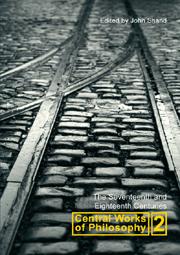Book contents
- Frontmatter
- Contents
- Contributors
- Preface
- Seventeenth- and Eighteenth-Century Philosophy: Introduction
- 1 René Descartes: Meditations on First Philosophy
- 2 Baruch Spinoza: Ethics
- 3 G. W. Leibniz: Monadology
- 4 Thomas Hobbes: Leviathan
- 5 John Locke: An Essay concerning Human Understanding
- 6 George Berkeley: A Treatise Concerning the Principles of Human Knowledge
- 7 David Hume: A Treatise of Human Nature
- 8 Jean-Jacques Rousseau: The Social Contract
- Index
Seventeenth- and Eighteenth-Century Philosophy: Introduction
- Frontmatter
- Contents
- Contributors
- Preface
- Seventeenth- and Eighteenth-Century Philosophy: Introduction
- 1 René Descartes: Meditations on First Philosophy
- 2 Baruch Spinoza: Ethics
- 3 G. W. Leibniz: Monadology
- 4 Thomas Hobbes: Leviathan
- 5 John Locke: An Essay concerning Human Understanding
- 6 George Berkeley: A Treatise Concerning the Principles of Human Knowledge
- 7 David Hume: A Treatise of Human Nature
- 8 Jean-Jacques Rousseau: The Social Contract
- Index
Summary
The philosophers in this volume mark what may be argued is the second major watershed in the intellectual development of mankind. If Plato is the father of the coming of age of mankind, then the philosophers gathered around the Enlightenment are the thinkers who spread this more mature intellectual outlook deeply and widely throughout the psyche and institutions of the Western world. Kant was asked in 1784 to say what is Enlightenment, and he replied that:
Enlightenment is man's emergence from his self-incurred immaturity. Immaturity is the inability to use one's own understanding without guidance of another. It is self-incurred, when it depends on a deficiency, not of reason, but of the resolve and courage to use it without external guidance. Thus the watch word of enlightenment is Sapere aude! Have the courage to use one's own reason!
(Kant 1784: 481, translation modified)Maturity of mind is a pretty good definition of philosophy: using one's own reason and understanding to think things out for oneself, and following this through wherever it may lead. Plato began this process, but the battle to complete that process was not won by him, and for the generality of humanity it probably never will be. Many seem all too willing to have others tell them what they ought to think, even as they may strongly claim they are making up their own minds. However, there are degrees of success.
- Type
- Chapter
- Information
- Central Works of Philosophy , pp. 1 - 14Publisher: Acumen PublishingPrint publication year: 2005



